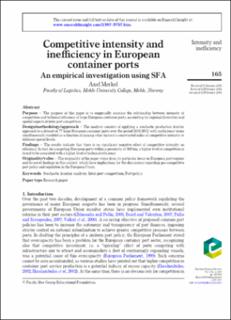Competitive intensity and inefficiency in European container ports : an empirical investigation using SFA
Peer reviewed, Journal article
Published version

Åpne
Permanent lenke
https://hdl.handle.net/11250/3092670Utgivelsesdato
2018Metadata
Vis full innførselSamlinger
- Artikler [412]
- Publikasjoner fra Cristin [429]
Sammendrag
Purpose: The purpose of this paper is to empirically examine the relationship between intensity of competition and technical efficiency of large European container ports, accounting for regional diversities and spatial aspects of inter-port competition. Design/methodology/approach: The analysis consists of applying a stochastic production frontier approach to a dataset of 77 large European container ports over the period 2002-2012, with inefficiency terms simultaneously modeled as a function of (among other factors) a constructed index of competitive intensity at different spatial levels. Findings: The results indicate that there is no significant negative effect of competitive intensity on efficiency. In fact, for competing European ports within a proximity of 300 km, a higher level of competition is found to be associated with a higher level of technical efficiency. Originality/value: The originality of the paper stems from its particular focus on European port regions and its novel findings in this context, which have implications for the discussions regarding pro-competitive port policy and regulation in the European Union. Keywords: stochastic frontier analysis, inter-port competition, port policy
